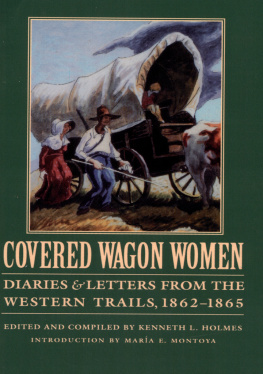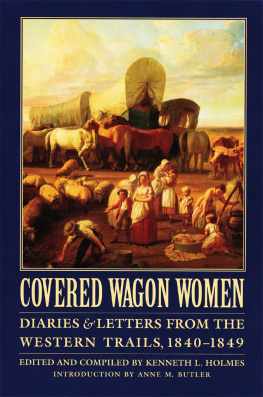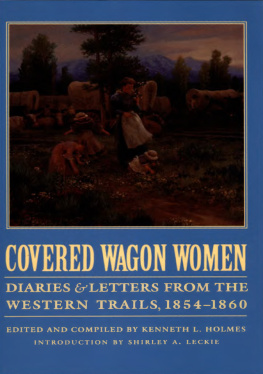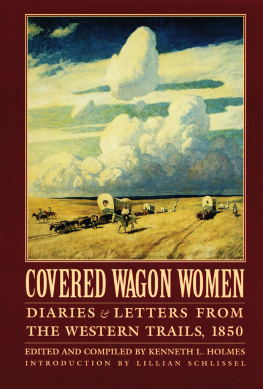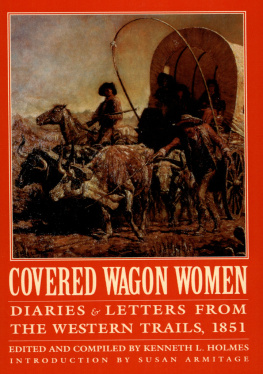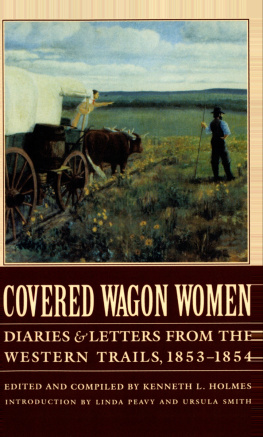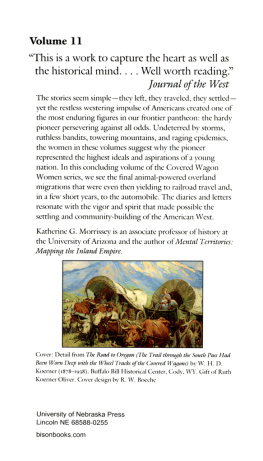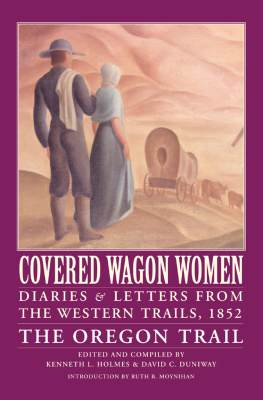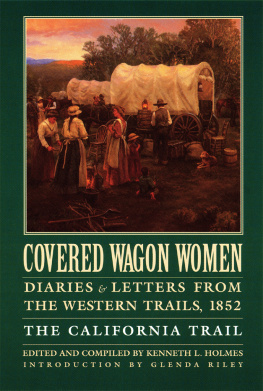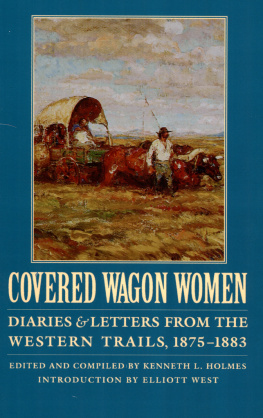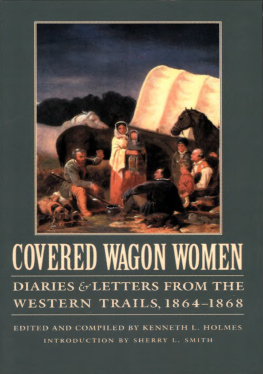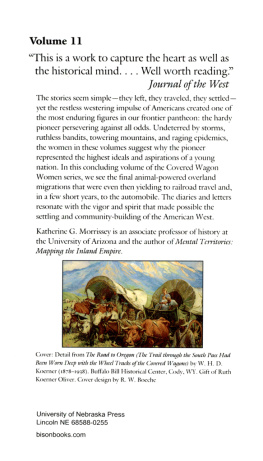Kenneth L. Holmes - Covered Wagon Women, Volume 8
Here you can read online Kenneth L. Holmes - Covered Wagon Women, Volume 8 full text of the book (entire story) in english for free. Download pdf and epub, get meaning, cover and reviews about this ebook. year: 2014, publisher: Bison Books, genre: Detective and thriller. Description of the work, (preface) as well as reviews are available. Best literature library LitArk.com created for fans of good reading and offers a wide selection of genres:
Romance novel
Science fiction
Adventure
Detective
Science
History
Home and family
Prose
Art
Politics
Computer
Non-fiction
Religion
Business
Children
Humor
Choose a favorite category and find really read worthwhile books. Enjoy immersion in the world of imagination, feel the emotions of the characters or learn something new for yourself, make an fascinating discovery.
- Book:Covered Wagon Women, Volume 8
- Author:
- Publisher:Bison Books
- Genre:
- Year:2014
- Rating:4 / 5
- Favourites:Add to favourites
- Your mark:
- 80
- 1
- 2
- 3
- 4
- 5
Covered Wagon Women, Volume 8: summary, description and annotation
We offer to read an annotation, description, summary or preface (depends on what the author of the book "Covered Wagon Women, Volume 8" wrote himself). If you haven't found the necessary information about the book — write in the comments, we will try to find it.
Covered Wagon Women, Volume 8 — read online for free the complete book (whole text) full work
Below is the text of the book, divided by pages. System saving the place of the last page read, allows you to conveniently read the book "Covered Wagon Women, Volume 8" online for free, without having to search again every time where you left off. Put a bookmark, and you can go to the page where you finished reading at any time.
Font size:
Interval:
Bookmark:


1989 by Kenneth L. Holmes. Reprinted by arrangement with the Arthur H. Clark Company.
Introduction to the Bison Books Edition 1999 by the University of Nebraska Press
All rights reserved
Library of Congress Cataloging-in-Publication Data
The Library of Congress has cataloged Vol. 1 as:
Covered wagon women: diaries & letters from the western trails, 18401849/ edited and compiled by Kenneth L. Holmes; introduction to die Bison Books edition by Anne M. Butler, p. cm.
Originally published: Glendale, Calif: A. H. Clark Co., 1983.
Reprinted from volume one of the original eleven-volume edition
T. p. verso.
Volume 1.
Includes index.
ISBN 0-8032-7277-4 (pa: alk. paper)
ISBN-13: 978-0-8032-7692-5 (electronic: e-pub)
ISBN-13: 978-0-8032-7693-2 (electronic: mobi)
1. Women pioneersWest (U.S.)Biography. 2. West (U.S.)History. 3. West (U.S.)Biography. 4. Overland journeys to the Pacific. 5. Frontier and pioneer life West (U.S.) I. Holmes, Kenneth L.
F591.C79 1996 978dc20 95-21200 CIP
Volume 2 introduction by Lilian Schlissel
ISBN 0-8032-7274-X (pa: alk. paper)
Volume 3 introduction by Susan Armitage
ISBN 0-8032-7287-1 (pa: alk. paper)
Volume 4 introduction by Glenda Riley
ISBN 0-8032-7291-X (pa: alk. paper)
Volume 5 introduction by Ruth B. Moynihan
ISBN 0-8032-7294-4 (pa: alk. paper)
Volume 6 introduction by Linda Peavy and Ursula Smith
ISBN 0-8032-7295-2 (pa: alk. paper)
Volume 7 introduction by Shirley A. Leckie
ISBN 0-8032-7296-0 (pa: alk. paper)
Volume 8 introduction by Maria E. Montoya
ISBN 0-8032-7297-9 (pa: alk. paper)
Reprinted from volume eight (1989) of the original eleven-volume edition titled Covered Wagon Women: Diaries and Letters from the Western Trails, 18401890, published by The Arthur H. Clark Company, Glendale, California. The pagination has not been changed and no material has been omitted in this Bison Books edition.
The publisher does not have any control over and does not assume any responsibility for author or third-party websites or their content.
Introduction the Bison Books Edition
Maria E. Montoya
If I were only a word painter I would try to give you a description of it but Nature has blessed me with no such gift & so I can give you no idea of it but only tell you that it was grand splendid & magnificent.
Louisa Cook
So why publish or read another collection of trail diaries from White, relatively middle-class women? It has been over twenty years since John Mack Faragher published Women and Men on the Overland Trail and opened up an unexamined world of relationships between families as they traveled West. Since then, the field of western womens history has blossomed and produced some of the most interesting and provocative work in the fields of womens history, history of the American West, and labor history. So to publish yet another volume of diaries and letters, which seemingly reiterate and cover ground already well trod upon by historians, seems redundant or at the very least boring. Yet, one can not pick up this collection of womens writings and not be drawn into the drama of their everyday lives as they struggled to maintain a family, some sense of home, and their own identities as they persevered in the West. These writings offer fresh and personal insight into familial relations, national politics, and race relations on the Great Plains and in the Far West. In the words of Louisa Cook above, these are grand splendid & magnificent.
The diaries and letters that appear in this collection from the University of Nebraska Press offer a Tare and important window into the feelings and lives of nine women who shared relatively little in common with one another before they left their homes to travel west. One of the great assets of these collections is that they remind us of the individuality of the real humans who lived these experiences: few generalizations can be made about this cohort. Aside from their similar experience of traveling overland during the early 1860s, their worlds differed tremendously and consequently they experienced the trail in ways unique to their own personal situations. Some, like Ellen Tootle, were wealthy and traveled in relative luxury, while others, like Mary Ringo, barely made financial ends meet and had spent their familys life savings to make this trip and a new start in the Far West. These women also represent a variety of ages and life experiences. A couple of the women made the trip West for pleasure and returned within the year to their homes back East: Harriet Hitchcock was fourteen and on a short family trip to prospect for gold and Ellen Tootle was on her honeymoon with her husband who was looking into expanding his business west. The majority of these women, however, were making permanent moves that would change the course of their lives as they took themselves and their families to a new environment and a whole new set of experiences.
Each woman was quite diverse and unique in the choices she made about what to tell and her feelings about the move. As you read through the entries you will be charmed by their individuality in prose style and personality. Some of the women, in particular Louisa Cook and Harriet Hitchcock, exhibit a wonderful sense of humor. Hitchcock sees the world from her naive vantage point of fourteen years, and while she parrots the ugly racism of her parents regarding Indians, she also makes wonderfully insightful and funny comments about the odd characters she encounters in the mining fields of Colorado. Louisa Cook, a single mother traveling west to make a new life for herself and her child, writes home to her family, if you do not hear from me for a long time you must not think I am dead or married (might as well be one or the other) but keep writing Direct to Portland (55). This woman has taken control of her unfortunate position and even finds levity in her situation. When she arrives in Oregon, she again writes her family to tell them of the bright prospects for single women like herself, as there is but one available lady for every one hundred men, and she soon takes advantage of the gender imbalance and finds herself a suitable mate (57). Like all of the women in this collection, Louisa Cook is an active participant in the world around her and creates opportunities for herself.
Other woman, particularly the ones with large families, find little amusing as they make the difficult trip. You can feel the exhaustion that must have racked these womens bodies as they did the difficult work of maintaining a family on the trail. Mary Lightner, a Morman woman, traveling with her husband and seven children to settle in Utah wrote in the middle of the trip, Camped in dust as if in the middle of the street in the States. Baked a shortcake, fried some bacon and had tea for supper after dark. Tired almost to deathlost the childrens pet rabbit today (103). Just the normal day of cooking, cleaning, dressing children, and keeping them from harms way was more than enough for any woman, but the added stress of the lost pet rabbit with all of its attendant whining and worrying about leaving it behind was more than most of us can bare in the comfort of our own modem homes, much less in the middle of nowhere with few basic comforts.
Some of the writings are just downright gloomy. One cannot read Mary Ringos diary without the eerie feeling that this woman had a premonition that disaster was about to befall her family. Throughout the diary she seems depressed, overwhelmed, and anxious, Two weeks before her husband accidentally shot himself, leaving her eight months pregnant and with five children, she came across the grave of a man who had accidentally shot himself and later wrote, I pray God we may get along safely (216). The despair and loneliness that she endured after her husbands tragic and sudden, death is difficult to read as she left her husband buried along the trail and pushed on with her young family. As Mary Ringo moved farther West she became less self-absorbed dealing with the very public world of concerned emigrants who help her move her wagon and the merchants to whom she wants to sell her possessions so that she can take the stagecoach west with her family. Since Mrs. Ringo does not have enough possessions to sell in order to pay for their passage, she has to continue the trip and drive her family all the way to Oregon, but not before another disaster visits her family.
Next pageFont size:
Interval:
Bookmark:
Similar books «Covered Wagon Women, Volume 8»
Look at similar books to Covered Wagon Women, Volume 8. We have selected literature similar in name and meaning in the hope of providing readers with more options to find new, interesting, not yet read works.
Discussion, reviews of the book Covered Wagon Women, Volume 8 and just readers' own opinions. Leave your comments, write what you think about the work, its meaning or the main characters. Specify what exactly you liked and what you didn't like, and why you think so.

